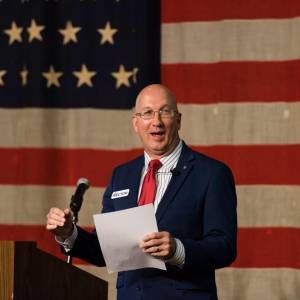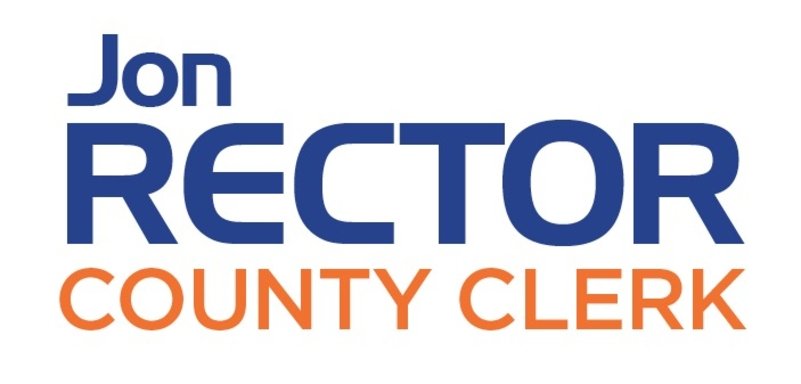Jon Rector, candidate for county clerk, was kind enough to answer some of my questions regarding his plans for the county clerk position. Mr. Rector is currently in a challenged primary that will be decided on March 20.
Smile Politely: For those readers who don’t know you, could you tell us a bit about your background and why you feel you would be a good fit for Champaign County Clerk?
 Jon Rector: I have spent my entire life in Champaign County. I was raised in Champaign and attended Westview, Jefferson, and Centennial. I received undergraduate and graduate degrees from EIU. I am married to Cathy, have three sons who live in Champaign County, and two grandchildren.
Jon Rector: I have spent my entire life in Champaign County. I was raised in Champaign and attended Westview, Jefferson, and Centennial. I received undergraduate and graduate degrees from EIU. I am married to Cathy, have three sons who live in Champaign County, and two grandchildren.
I spent fifteen years in banking, seven years as marketing director at Willard Airport, and several years in broadcast TV and marketing. More than anything, the county clerk’s position needs to be about community engagement. For my entire life I have been involved in countless organizations and efforts in Champaign County with the goal of improving people’s lives. (Right: Jon Rector. Photo from Facebook.)
I have been on the county board for almost two years and have worked closely with my fellow Republican board members dealing with the difficult issues that face Champaign County. I have always stood up for what I believed was the right thing to do for the people and for this county. This experience, along with my twenty years serving on the Sheriff’s Merit Commission, assisting with providing the citizens of Champaign County with the best individuals to put on the streets to protect them, gives me several decades of experience with the Republican party.
Few things can have a more positive impact on our communities than voting and participating in elections. I’ll take the same experience and leadership skills that I have employed in various organizations in our community and apply them to the county Ccerk’s office.
SP: While the roles of a county clerk are numerous, they are not always entirely clear to the public. As clerk of Champaign County, what will your duties be?
Rector: As county clerk, my responsibility will be to manage the staff already in place to ensure the day-to-day duties of the office are properly carried out. I also will have the responsibility to lay out a vision for the office to continue to move forward in providing increased levels of service, integrity, transparency, and voter participation.
The county clerk has four principal areas of work. The most well known to the public is the administration of elections in Champaign County. Many people also are familiar with the county clerk’s office in the role of maintaining vital records such as birth and marriage records. The County Clerk also has a critical role in the property tax cycle. Finally, the county clerk is the clerk for the Champaign County Board
SP: County clerks play a large role in ensuring the success of local elections. Voter turnout, education, and fraud prevention are all large parts of this, and topics such as voter ID laws have become hot-button. As county clerk, how will you address these issues?
Rector: It is important that people understand that in many areas the county clerk’s role is strictly defined by state statutes. For example, voter ID laws in Illinois are not determined by local county clerks but rather by the legislature.
But there are some important areas where a local county clerk can exercise some discretion to improve the election process in the areas of integrity, participation, and voter education.
I will work to increase participation by giving students tools to get absentee ballots in their home county if they want. Currently, students are often registered to vote in their home county but have a difficult time getting an absentee ballot. We will use technology to help those students, saving Champaign County money and making those students’ votes more meaningful to them.
I also support efforts to reduce the possibility of fraud. First, I promise to continue the practice of the last two county clerks in keeping all voting and tabulating equipment offline so that there is no possibility of outside access. Second, I would make use of the statewide voter file to verify the voting status of people who register to vote on Election Day.
I have already moved to improve voter education in my campaign and would continue to do so as county clerk. I have produced a series of Election 101 videos that educate people on some aspects of the voting process that they might not be aware of. They have been well received, and I plan to do more for the fall campaign and as county clerk.
SP: Crosscheck, a program that Illinois is currently a part of, is a topic of heated debate. Could you explain, from your perspective, what the program is and whether you favor its continued use?
Rector: Crosscheck and the Electronic Registration Information Center (ERIC) are two programs that collect voter registration data from various states to look for possible duplicates. Neither program requires any election authority to remove a voter based on the information collected. For Champaign County, this information is worthwhile to have, but it is critical that proper safeguards are established to ensure no one is removed improperly from the voter rolls.
SP: At the federal level, President Trump recently disbanded a commission to find voter fraud in US elections. The commission received bipartisan backlash, although President Trump still stands by it. As county clerk, would you support such a commission? Please answer “yes” or “no” and explain why.
Rector: I support such a commission as a means of enhancing the public’s confidence in our election process. Opponents of the commission and those who were taking steps to obstruct it claim that there are no problems. If that is the case, it seems that the commission would serve to demonstrate that point to the public.
SP: America is known for its abysmally low voter turnout rates, and many advocates have pushed for reforms to ensure that everyone has the right to vote. Among these are: designating election day as a national holiday, holding voting on the weekend, automatic voter registration (which was recently passed in Illinois), and designating two or more days as official “election days.” What are your thoughts on these reforms, and how will you help implement them as clerk?
Rector: In Illinois, there are many ways for people to cast a ballot in advance of the election. At some point we need to recognize that those who don’t participate are often turned off by the process and don’t feel that their votes will matter. So more important than changes in the voting process is changes in our governance. We need to be more responsive and transparent and make sure people know that their participation is going to matter in their lives.
SP: Reforms such as ranked choice voting, range voting, and approval voting have been discussed prominently in other US cities and states. What are your positions on these ballot reforms?
Our newer election equipment makes these voting reforms possible, and I’m open to exploring them. In particular, in the areas of municipal primaries and special Congressional elections, we might be able to utilize alternative voting methods to save money and achieve higher participation rates.
SP: If readers have any more questions for you or would like to assist your efforts, how should they contact your campaign?
Readers can volunteer or donate to our campaign at our website, and I can be reached directly on Facebook and by email.








